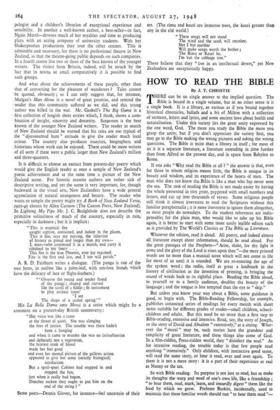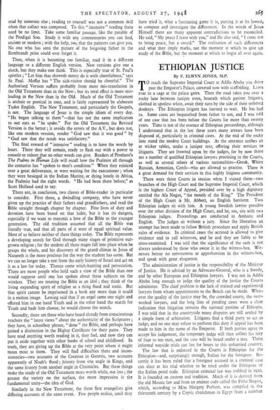HOW TO READ THE BIBLE
By J. T. CHRISTIE
THERE can be no single answer to the implied question. The Bible is bound in a single volume, but in no other sense is it a single book. It is a library, as various as if you bound together historical chronicles, ballads and a bit of Milton with a collection of sermons, letters and lyrics, and some ancient laws about health and naturalisation. Under this variety lies the great unity expressed by the one word, God. The more you study the Bible the more you grasp the unity, but if you don't appreciate the variety first, you may go to the Bible making the wrong pictures and asking the wrong questions. The Bible is more than a library in itself ; for most of us it is a separate literature, a literature extending in .time further than from Alfred to the present day, and in space from Babylon to Rome.
If one asks " Why read the Bible at all ? " the answer is that, even for those to whom religion means little, the Bible is unique in its beauty and wisdom, and its experience of the hearts of men. The man who does not know the-Bible is like a man who has never seen the sea. The task of reading the Bible is not made easier by having the whole presented in tiny print, peppered with small numbers and letters, and cut up into thousands of verses. Some religious people still think it almost irreverent to read the Scriptures without this familiar paraphernalia ; it is more irreverent to ignore them altogether, as most people do nowadays. To the student references are indis- pensable; for the plain man, who would like to take up his Bible again, it is better to start with some more easily legible editon such as is provided by The World's Classics or The Bible as Literature.
Whatever the edition, read it aloud. All poetry, and indeed almost all literature except sheer information, should be read aloud. For the great passages of the Prophets—" Arise, shine, for thy light is come and the glory of the Lord is risen upon thee "—the mere printed words are no more than a musical score which will not come to life for most of us until it is sounded. We are re-entering the age of the spoken word ; the radio, itself as great a landmark in the history of civilisation as the invention of printing, is bringing the sound of words back to its rightful place. Reading the Bible aloud, to yourself or to a family audience, doubles the beauty of the language ; and the tongue is less tempted than the eye to " skip."
But unless you know your way about a Bible, some guidance is good, to begin with. The Bible-Reading Fellowship, for example, publishes connected series of readings for every month with short notes suitable for different grades of reader—small children, school- children and adults. But this need be no more than a first step to Bible-reading, extensive and intensive. Read, say, the story of Joseph, or the story of David and Absalom " extensively," at a sitting. What- ever the " moral " may be, such stories have the grandeur and simplicity of great literature, and these things also come of God. In a film-ridden, Press-ridden world, they "disinfect the soul." As for intensive reading, the trouble today is that few people read anything " intensively." Only children, with instinctive good sense, will read the same story, or hear it read, over and over again. To them it is not a mere story : it is a part of their experience as real as Nanny or the cat.
So with Bible reading. Its purpose is not just to read, but to make its thoughts the warp and woof of one's own life, hie a friendship ; " to hear them, read, mark, learn, and inwardly digest" them like the food by which we grow. Profesor Burkitt, incidentally, used to maintain that those familiar words should run " to hear them read
read by someone else ; reading to yourself was not a common skill when that collect was composed. To this " intensive " reading there need be no limit. Take some familiar passage, like the parable of the Prodigal Son. Study it with any commentaries you can find, ancient or modern ; with the help, too, that the painters can give you. No one who has seen the picture of the forgiving father in the Rembrandt print could ever forget it.
Then, ,when it is becoming too familiar, read it in a different language or a different English version. New yersions give one a shock, but they make one think. This is especially true of St. Paul's epistles ; " Let him that sheweth mercy do it with cheerfulness," says St. Paul. Moffat has " The sick-visitor should be cheerful." The Authorised Version suffers probably from more mis-translation in the Old Testament than in the New ; but its total effect is more mis- leading in the New than ill the Old. Much of the Old Testament is archaic or poetical in tone, and is fairly represented by elaborate Tudor English. The New Testament, and particularly the Gospels, is not. The language of Jesus is the simple idiom of every day. " He began talking to them "—that has not the same implication to our ears as "he spake." For the Old Testament the Revised Version is the better ; it avoids the errors of the A.V., but does not, like one modern version, render " God saw that it was good " by "God saw that the result was satisfactory."
The final reward of "intensive" reading is to have the words by heart. There they will remain, ready to flash out with a power to console or exhort that no other words can give. Readers of Prothero's The Psalms in Inman Life will recall how the Psalmist all through the centuries has " spoken to men's condition." When they rejoiced over a great deliverance, or were waiting for the executioner ; when they were besieged in the Indian Mutiny, or dying lonely in Africa, the Psalmist had the right words. "He had been there before," as Scott Holland used to say.
There are, in conclusion, two classes of Bible-reader in particular to consider. First those, a dwindling company, who have never given up the practice of their fathers and grandfathers, and read the Bible straight through chapter by chapter. Fine lives of duty and devotion have been based on that habit, but it has its dangers, especially if we want to transmit a love of the Bible to the younger generation. The old tradition assumed that all the Bible was literally true, and that all parts of it were of equal spiritual value. Most of us believe neither of these things today. The Bible represents a developing search for God through many stages of primitive out- grown religion ; for the student all these stages fall into place when he grasps the whole, and his discovery of the grand climax in Jesus of Nazareth is the more precious for the way the student has come. But we can no longer take a text from the early history of Israel and act on it as a law for today. Thence come witch-hunting and persecution. There are more people who hold such a view of the Bible than one would suppose until one has spoken about these subjects on the wireless. They are treating the Bible as an idol ; they think of the living expanding spirit of religion as a thing fixed and static. But that spirit cannot be imprisoned in a book any more than it could in a molten image. Lessing said that if an angel came one night and offered him in one hand Truth and in the other hand the search for Truth and bade him choose, he would choose the search.
Secondly, there are those who have heard already from conscientious teachers the " latest views " about the authenticity of the Scriptures ; they have, in schoolboy phrase, " done " the Bible, and perhaps have gained a distinction in the Higher Certificate for their pains. They have read anything worth reading in it, they feel, and now they can put it aside together with other books of school and childhood. In truth, they are giving up the Bible at the very point where it might mean most to them. They will find difficulties there and incon- sistencies—two accounts of the Creation in Genesis, two accounts apparently of Noah's flood ; .history from one angle in Kings, and the same history from another angle in Chronicles. But these things make the study of the Old Testament more worth while, not less ; the greater the variety on the surface, the more impressive is the fundamental unity—the idea of God.
Similarly in the New Testament, the three first evangelists give. differing accounts of the same event. Few people realise, until they have tried it, what a fascinating game it is, putting it at its lowest,, to compare and investigate the differences. In the words of Jesus Himself there are many apparent contradictions to be reconciled. He said, " My peace I leave with you," and He also said, " I came not to bring peace, but a sword." The realisation of such differences and what they imply marks, not the moment at which to give up study of the Bible, but the moment at which to begin all over again.



































 Previous page
Previous page